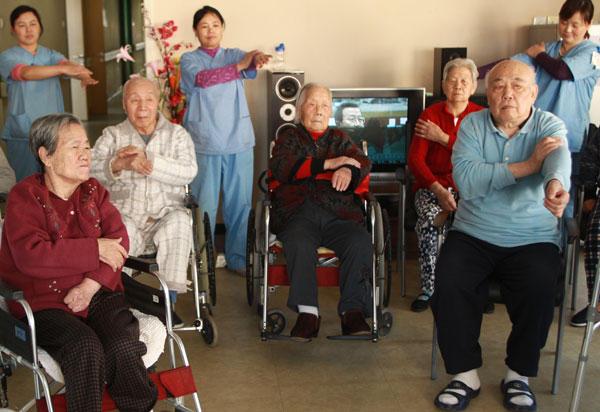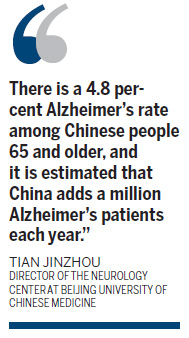Society
No country for Alzheimer's patients
By Li Li (China Daily)
Updated: 2011-03-22 07:43
 |
Large Medium Small |
Not many options
However, most nursing homes aren't equipped to care for Alzheimer's patients. Beijing Intech Nursing Home, a private facility that opened in 2006, is one of the few that accepts people with dementia.
"Thirty percent of our 40 residents suffer from medium or severe dementia," said the director, Guan Xiaoli, who lived in Sweden for 16 years and worked in Swedish nursing homes.
Guan intends to bring the Swedish nursing quality here with its attentive details: Instead of room numbers, photos of residents are pinned on doors so dementia patients can locate their rooms easier. Bright colors such as red can agitate the patients, so most walls are painted a more peaceful light green, yellow or blue.
|
 Staff members at Beijing Intech Nursing Home teach exercises to residents, including some with Alzheimer's disease. The exercise sessions are scheduled twice a day. Photos by Feng Yongbin / China Daily |
Upon admission, every resident undergoes a physical and psychological evaluation. People with cognitive disorders such as dementia or a high risk of falling will be given intensive care, at a higher rate, Guan said. "Our average charge ranges from 4,000 to 8,000 yuan ($609 to $1,218) per month."
Most residents come from comparatively wealthy families. You can find among them a professor from Tsinghua University, one of the country's most prestigious higher education institutes, and engineers from important government departments.
Beijing Statistics Bureau reports the city's average monthly pension was 2,032 yuan in 2010 and the average monthly income 3,726 yuan in 2009. That means high-end nursing homes such as Intech are out of ordinary people's reach.
Getting in isn't easy
With strong financial support, State-owned nursing homes have managed to keep their prices well under the market price. Beijing No 1 Social Welfare Institute charges an average of 1,050 to 1,500 yuan a month. That includes a standard bedroom, standby service from the affiliated hospital, well-designed gardens, 24-hour security staffing, and recreational options ranging from English lessons to shuffleboard, from calligraphy to an Internet cafe.
"We only admit those who fit our admission standards," said Zhou Ka, vice-president of the institute. "We don't admit old people with psychosocial diseases such as Alzheimer's." The institute has neither the facilities nor the appropriate professional staff, Zhou said.
|
 |
Alzheimer's patients are also rejected in many other State-run nursing homes. Even those who fit the admission standards have to wait for years before checking in.
"Most of our fresh residents registered with us back in 2004 or 2005," said Shang Zhenkun, who works in the institute's marketing department. "We spend a large amount of time every day dealing with impatient family members. There are simply too many elderly people."
China estimated 167 million people 60 and older - considered elderly in China - in 2009 and expects to have 216 million by 2015, making up 16.7 percent of the country's population, according to the China National Working Commission on Aging.
A few State-owned nursing homes accept dementia patients, among them Beijing Songtang Caring Hospice, Beijing No 3 Social Welfare Institute and Shanghai No 3 Social Welfare Institute. But for the country's millions of demented elderly people, the waiting lists are too long.
| 分享按钮 |